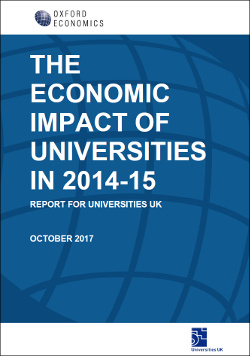Ungated Post | 16 Oct 2017
The Economic Impact of Universities in 2014-15

This report for Universities UK investigates the contribution of the the higher education sector to the UK economy. It identified that in 2014-15, Universities directly employed 404,000 people, created a £21.5 billion gross value added contribution to UK GDP, and generated £5.3 billion in tax receipts.
The importance of universities to the economy goes far beyond this direct contribution, however. By spending money in the wider economy, students, visitors to them, and universities themselves, support economic activity in a wide range of industries. Adding these economic effects together means that in 2014-15, universities supported a total gross value added contribution of £52.9 billion to UK GDP―2.9 percent of the country’s total economic output. They sustained 940,000 jobs, 3 percent of total UK employment, and generated £14.1 billion in tax receipts, 2.7 percent of UK Government tax revenue in the year.
For the first time in this series of reports, Oxford Economics has also explored the impact of universities on the productive capacity of the UK economy. Through higher education, universities provide students with skills and knowledge, which, in 2014-15, boosted the UK’s human capital stock by an estimated £63 billion. Further, their £7.9 billion of research and development activities in the year were estimated to deliver a stream of private and social returns equivalent to £28.9 billion gross value added, or £1,000 in income per household.
Oxford Economics’ team is expert at applying advanced economic tools that provide valuable insights into today’s most pressing business, financial, and policy issues.
To find out more about our capabilities, contact:
Americas
Diantha Redd
+1 (646) 503 3052
Email
Asia Pacific
Peter Suomi
+65 6850 0110
Email
EMEA
Aoife Pearson
+44 (0)203 910 8054
Email
Related Services

Post
The economic impact of abandoning the WTO
Oxford Economics have been commissioned by the International Chamber of Commerce (ICC) to provide an independent assessment of the economic impact of WTO dissolution. This report details our findings and the assumptions underpinning our analysis.
Find Out More
Post
The economic impact of the sports activities of public service media
This study shows how the sports activities of public service media supported €4.5 billion of GDP and 57,000 jobs across 31 European countries in 2022. The report also highlights wider economic benefits of public service media sports coverage, such as the way in which it leverages sponsorship income for sports bodies.
Find Out More
Post
Global Trade Education: The role of private philanthropy
Global trade can amplify economic development and poverty alleviation. Capable leaders are required to put in place enabling conditions for trade, but currently these skills are underprovided in developing countries. For philanthropists, investing in trade leadership talent through graduate-level scholarships is an opportunity to make meaningful contributions that can multiply and sustain global economic development.
Find Out More